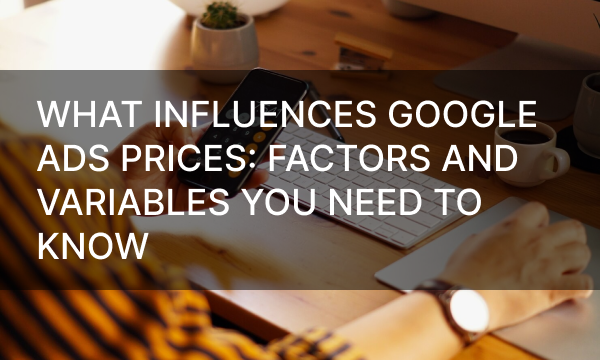In the modern world online marketing is one of the most efficient ways to spread the word about your product or services to people who may be interested in purchasing. This tendency has made it crucial for business owners and advertising specialists to be able to manage and optimize their advertising strategies on the web. There are many services, platforms and tools that help marketing agents and entrepreneurs to succeed in each step of their advertising journey, simplifying and speeding up processes. One of such tools in Google Ads that can help achieve these goals is a Keyword Planner.
What Is Keyword Planner And Why Should You Use It?
Google Ads’ Keyword Planner helps marketing specialists and business owners that manage advertising themselves discover new and relevant keywords that fit in with the theme of their advertised products or services. This tool provides estimated data on costs, succession rates, hypothetical and real statistics on keywords used in a campaign over a period of time, which helps optimize your settings for the best possible results.
Benefits of using Keyword Planner in Google Ads:
- Plan out the average cost of the advertisements that use certain keywords;
- Discover suggestions for new keywords to utilize in your ad campaign depending on subjects your products or services are oriented around;
- Find out the estimated numbers of searches for each of your keyword per period of time;
- Create new ad campaigns with keyword settings straight from your planner to center your marketing around keyword searches;
- Organize your keywords into different ad groups or in-ad categories to see how they work best.
In a nutshell, Keyword Planner allows you to manage your keywords in a much more efficient and simple way through analyzing current trends and giving you an abundance of keywords ideas.
Setting Up, Creating And Organizing
Now that you have decided to adopt using Google Ads Keyword Planner for your ad campaigns, it’s time to set everything up and get it running.
note that in order to be able to use Keyword Planner, you must meet meet two criteria in Google Ads:
- Your Google Ads account must be complete with your billing information and at least one campaign — which, however, does not have to be currently running;
- Your Google Ads account must be in Expert mode in order to enter and utilize a keyword planner tool. That is, You will not have access to it in Smart mode, but You can always change it in your account settings or in your ad campaign settings.
Once you’ve opened your Keyword planner, you can start working with it and creating your first set plans in two ways: discovering new keywords or uploading your existing ones to get estimates and forecasts.
In the discovery menu you can enter example keywords or a URL leading to a website of a suitable theme to generate new ideas for keywords to use in your ad campaign. On top of that, you can generate keyword ideas based on seasons, specific dates or language and country. You can then edit your results through filters and categories to see more specifically what kinds of keywords you’ve been suggested. Filters can sort your results by text, searches per period of time, ad impressions, competition and many more. What All of the above do is get you keyword suggestions that are more relevant to certain services or products, as compared to general queries.
After generating a hefty amount of new keywords or having gathered them yourself, you can now get into the Keyword Planner forecasts and look for estimated data on how your input keyword may perform. These estimates are based on many factors and statistical data that Google gathers across its platforms and can provide a rough estimate needed for planning your marketing budget. Bear in mind that these estimates should only be used for referential purposes, as market trends and tendencies change over time or rather suddenly, making automatic forecasts less relevant.
In your forecast menu you can get estimates for your keyword performance with a set daily budget, bid strategy, ad and keyword groups, date range and so on . Your plan now shows you potential numbers or conversions, impressions, clicks or searchers that your keywords are most likely to generate with the current settings and customer sentiment.
Once you’ve explored Keyword Planner and got a hang of it, don’t hesitate to revisit it along with other analytical Google Ads tools, whenever you need to adjust or refine your keywords.
Tips For Researching New Keywords
However helpful Google Ads Keyword Planner may be, sometimes you’ll only end up with a few results that will be relevant for your advertising campaign, while other keywords included in your ads will bring you a small return. This greatly affects the success of your running ads and the overall campaign and can be harmful to your marketing funds. Such turnout may result from poorly configured setup or selecting keywords without careful consideration.
Below are a few tips for picking new keywords that will be the most relevant to your marketing campaigns:
Imagine how your customers see the product. Think about what your potential customer is going to search for when looking for businesses that can meet their needs. That is exactly what your keywords should represent. However, avoid including in your keyword list an actual search query that may be entered — a keyword should always be a precise and conclusive bit of information that represents your products or services;
Keep your specification at a moderate level. Your potential customers may not have a very clear idea when they begin their search . Your job is to craft keywords that strike a balance — specific enough to trigger relevant ads but broad enough to capture users who may not be certain what they’re looking for.
Include your website. In Google Ads’ Keyword Planner you’re able to add your website along with the basic keyword information when researching new ideas for keywords to implement in your ad campaign. Your website is packed with valuable theme-specific information that can help identify the sort of keywords you’re looking for;
Remember about location. Using location in your keywords can have a substantial impact on your marketing campaign — both in a good and a bad way . Only use your desired location in your keywords if your potential customers will be able to get to your products or services. Consider excluding location mentions in keywords if you’re already using geotargeting in your ad campaign;
Use groups of related keywords. In your advertising campaign, choose to use keywords in groups that are related to each other and cover the same topic or are in fact synonyms. If your keyword group consists of vaguely related or unspecific keywords, its success rate will turn out much lower in comparison;
Include popular brand names. If some of your advertised products or services have a relation to a well-known brand or are actually their offering , don’t hesitate to include that in your keywords. A sizable portion of users prefer a brand they’ve already heard about to less known or even nameless brands that are new to the market. If your products or services are an offering of a smaller brand, consider keeping their name out of your keywords;
Keep your descriptions limited. Start your keyword group without great detail and only then add keywords with adjectives that describe your product or services or may be used by potential customers in their search query. Having all of your keywords contain descriptive adjectives may damage your search rates for web queries that contain no adjectives at all.
NOTE: Although keywords play an important role in your ad campaign’s success, remember that a truly successful performance depends on many other factors, such as your budget, your product or services type, current trends, customer behavior and so on.
Time For Analysis
You’ve set and picked out your fresh and relevant keywords and have input them into your Keyword Planner forecasts menu. Now that you see all the estimates Google Ads gives you, it’s time to make the last changes before implementing your new keywords into an existing or a new ad campaign.
After a while , remember to revisit your keyword reports and compare them to the forecasts you saw beforehand. See for yourself how accurate and relevant the estimated information turned out to be and — if the results aren’t to your liking – don’t hesitate to get back to your Keyword Planner to generate new ideas that will better fit the ever changing market situation. Remember that trends and tendencies in the marketing world are constantly shifting, making regular updates and adjustments necessary. Only by keeping up and managing your ad campaign will you be able to get the best results out of your marketing each day.
In Conclusion
To sum up, Google Ads Keyword Planner is a great specific tool for generating and analyzing new keyword ideas .
Keyword Planner helps you:
- Discover new keyword suggestions that will be relevant to your products or services;
- Find out the estimates for costs, clicks, impressions of each of your keyword;
- Organize your keywords into related groups for better effects.
- Plan out the average cost for running advertisements with set keywords;
- Create new ad campaigns with new keyword settings.
Using Keyword Planner will streamline keyword management and enhance your ad campaigns, whether you’re refining your existing keywords or creating new ones. Learn how you can use Keyword Planner for your needs and you will always have the right keywords for your customers to reach you.



